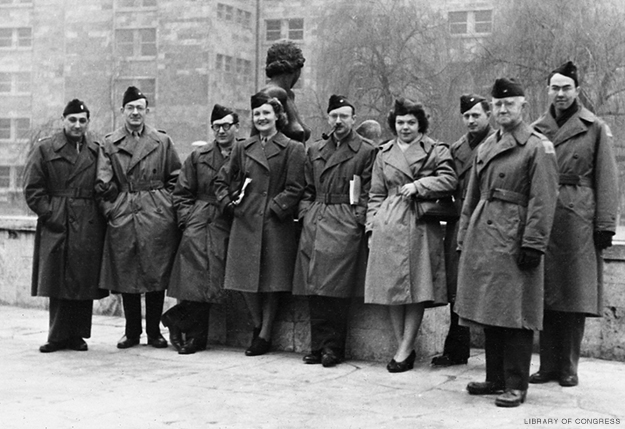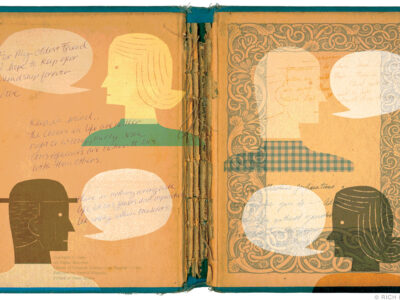
A new book explores a World War II–era pioneer of open-source intelligence.
Kathy Peiss, the Roy F. and Jeannette P. Nichols Professor of American History, normally studies the history of gender and sexuality. But a chance discovery—an online memorial to an uncle she never knew—led her in an unexpected direction. During World War II, Reuben Peiss was an agent of the Office of Strategic Services (OSS), the precursor to the Central Intelligence Agency. “I got my mother on the phone,” Peiss says, “and she said, ‘Oh, yes, Reuben was a spy.’”
She ultimately tracked down the man who had recruited her uncle into the OSS, Frederick Kilgour. Both men were librarians. Reuben Peiss would become a pioneer of open-source intelligence. First for the OSS and then for the Library of Congress Mission, which took over the operation in 1945, he would help sweep hundreds of thousands of purchased or confiscated European books, periodicals, and documents into American research collections.
Gazette contributor Julia M. Klein talked to Peiss about her latest book, Information Hunters: When Librarians, Soldiers, and Spies Banded Together in World War II Europe (Oxford University Press). Their conversation has been edited for length and clarity.
What was the nature of your uncle’s wartime work?
The OSS was interested not only in espionage but also in the kind of information that appeared in public sources that might be of use for understanding the enemy and the wartime situation. So they set up an agency that acquired foreign publications for the war effort. Most of the agents were located in neutral cities. Lisbon was very important—that was the one that Reuben Peiss was assigned to. Another was Stockholm, which was of particular interest to me because the only woman involved in this activity—Adele Kibre—was the head of the Stockholm unit.
What were the challenges of that mission?
The main challenge was getting timely information. These weren’t secret agents. Mainly what they were doing was acting like bookworms. They were going to bookstores, to publishers, to academics and trying to get newspapers, [scientific] journals, industrial manuals, anything that might give some insight into the economic and military situation.
How did the mission change over time?
After D-Day, this acquisition of materials became much more integrated into military efforts. There were Target Forces, or T-Forces, that followed the troops and gathered up everything.
What was particularly helpful?
They found, for example, full records of Nazi-affiliated officials.
A May 1946 Allied edict, Order No. 4, calling for the confiscation and destruction of all Nazi materials, proved controversial.
A lot of books published during the Nazi regime were seen as fostering Nazi or militaristic ideology. And the Allied Military Government for Occupied Territories believed this was a virus that needed to be eradicated. The British and the Americans were not wholly comfortable with this because of traditions of free speech.
[In the United States], there were a lot of editorials saying, “This is like book burning. Americans are just acting like Nazis.” The military government was taken aback. They were saying, “You can’t have American-style civil liberties in Germany right now.”
The solution was to save copies of every single one of these books for American research libraries and the United Nations library, and ultimately, when Germany was a democratic state, for German university libraries as well.
And Penn retains some of these Nazi-era books?
Penn has a collection. They run the gamut from ideologists’ books to genre fiction—detective stories, romances, and military stories that were produced for German soldiers on the front.
What other moral conundrums arose?
The question of what can be legitimately taken was one that troubled a number of the librarians and scholars. Book people love books, and they were tempted by books, and it’s pretty clear that some of them took books. There’s a certain kind of “spoils of war” notion.
What about the restitution of books looted from European Jews?
They restituted the books that they could—to the nation, not to the organization or the individual. That’s international law. And then there were a number of books that were not identifiable. Many of the Jews who owned these books had been killed, or the institutions destroyed.
What happened to those books?
After a couple of years, there were about 350,000 to 500,000 books that had not been restituted. Several organizations ultimately came together to create a group called Jewish Cultural Reconstruction (JCR). This group made a claim to the American government to become a successor agency for these books. About 45 percent went to Israel, and about 38 percent to the United States. [Most of the balance went to Africa and Latin America].
Does Penn have any?
The Herbert D. Katz Center for Advanced Judaic Studies, the foundation of which was [now defunct] Dropsie College, got a number of these books.
It’s a complicated history. What, if anything, should have been done differently?
I’ve been very unwilling to make a negative judgment about the behavior of the American military or American cultural leaders or workers. They were improvising all the time. I’m really quite impressed with what they were able to accomplish. The attitude of my uncle Reuben and many of the librarians was, “Let’s seize the moment and seize the stuff.” So it may be that they were too aggressive. What was behind this was this sense that it was a national security issue for American libraries to have a total collection of foreign books.
What is the legacy of these efforts?
The idea that international acquisitions would be a key part of American research institutions was a key consequence. A second one has to do with information science. Some of the librarians involved in handling this massive amount of intelligence material had to come up with information management tools before there were computers. Kilgour founded a collaborative database system, now known as WorldCat, the largest international bibliographic database.
You yourself own a book of uncertain provenance, given to your family by Reuben Peiss.
I own this rare book that is Spinoza’s first book on Descartes’s theories, published in the Netherlands in the 1660s. I got it from my father when I was taking high school Latin. The book stamp showed that it was from the Schaffgotsch Library, which had been looted in 1945. It was an aristocratic library in Silesia, part of Germany at the time and now part of Poland. Who took the book I do not know. Reuben probably got it in Berlin. He could have bought it on the black market. Someone might have given it to him. There’s no way to know.




